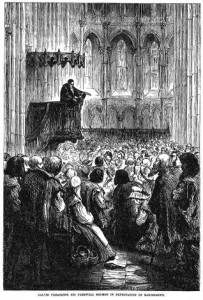When you hear the word “mystery” in a sermon or in the Bible, what do you do? What do you expect to happen next?
In a sermon on 1 Timothy 3:16 (“great is the mystery of Godliness”), John Calvin said that we should have two responses:
When we hear this word, mystery, let us remember two things; first, that we learn to keep under our senses, and flatter not ourselves that we have sufficient knowledge and ability to comprehend so vast a matter. In the second place, let us learn to climb up beyond ourselves, and reverence that majesty which passeth our understanding. We must not be sluggish nor drowsy; but think upon this doctrine, and endeavour to become instructed therein. When we have acquired some little knowledge thereof, we should strive to profit thereby, all the days of our life. (A Selection of the Most Celebrated Sermons of John Calvin (NY: S. & D.A. Forbes, 1830), p. 33.)
 This is good advice. It is designed to counteract two sinful responses we are tempted to have. Two major forms of sin are always playing tug of war with us: pride pulls one way, and sloth pulls another. When we hear “mystery” about the things of God, we are immediately tempted to puff up with arrogance and imagine ourselves capable of handling the mystery. Or we have the opposite reaction, and we give up, shut down, and assume there’s nothing in the mystery that’s worthy of summoning our powers of concentration. Check yourself to see which is your most habitual response. Most people veer back and forth between the two, or manage to be both proud and slothful at the same time (“I’m not going to bother to investigate, but if I did I could totally solve this”).
This is good advice. It is designed to counteract two sinful responses we are tempted to have. Two major forms of sin are always playing tug of war with us: pride pulls one way, and sloth pulls another. When we hear “mystery” about the things of God, we are immediately tempted to puff up with arrogance and imagine ourselves capable of handling the mystery. Or we have the opposite reaction, and we give up, shut down, and assume there’s nothing in the mystery that’s worthy of summoning our powers of concentration. Check yourself to see which is your most habitual response. Most people veer back and forth between the two, or manage to be both proud and slothful at the same time (“I’m not going to bother to investigate, but if I did I could totally solve this”).
So when you run across the word “mystery” in the Bible, stomp down your pride, wake up from your sloth, and pay attention. Flatter not yourself! Be not sluggish nor drowsy! God is telling you something.
(Note: I found this Calvin quotation in some notes I took on a 2009 conference paper by Jan van Vliet on mystery and sobriety in Calvin. The whole (unpublished?) paper was full of good stuff about curiosity, how “the secret things belong to the LORD our God” (Deut. 29:29), the “mere prattle” of some mystics, and how Scripture is wise even in its silences. There was also some good stuff on Warfield’s appeal to sentiments, and this interesting claim: 3.5% of Calvin’s Institutes is devoted to predestination, but 5% is about prayer.)